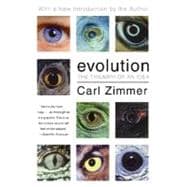About This Book
Evolution: The Triumph of an Idea
Author: Carl Zimmer
Carl Zimmer is a renowned author known for his engaging and accessible writing style, particularly in the field of evolution. This book, "Evolution: The Triumph of an Idea," is a comprehensive exploration of the theory of evolution from Darwin to the 21st century. Zimmer collaborates with leading scholars to present a compelling narrative that delves into the far-reaching implications of evolutionary theory.
Who Uses It?
Primarily, this book is used by students and educators in introductory biology and evolutionary science courses at the college and university levels. It is also a valuable resource for anyone interested in understanding the basics of evolution, including professionals looking to refresh their knowledge or expand their understanding of biological principles.
History and Editions
"Evolution: The Triumph of an Idea" was first published in 2006 by Harper Perennial. This book has been a go-to resource for those seeking an up-to-date view of evolution. It serves as a companion volume to the PBS series, offering a rich and detailed exploration of evolutionary concepts.
Author and Other Works
Carl Zimmer is the author of three well-received books on evolution. He is also a Guggenheim fellow and writes regularly for magazines such as *National Geographic*, *Science*, *Newsweek*, and *Natural History*. Zimmer's writing style is characterized by his ability to make complex scientific concepts accessible to a broad audience.
Detailed Information
ISBNs and Formats
Hardcover: ISBN-13: 9780061138409
eTextbook: ISBN-13: 9780061138416 (The ebook for "Evolution: The Triumph of an Idea" is available right here on eCampus.com!)
eTextbook: ISBN-13: 9780061138423 (The ebook for "Evolution: The Triumph of an Idea" is available right here on eCampus.com!)
Loose-leaf: ISBN-13: 9780061138430
Rental Options: Available through eCampus.com with various rental durations
Publication Details
Publisher: Harper Perennial
Publication Date: September 5, 2006
Number of Pages: 528
Language: English
Other Editions and Formats
Please note that while additional editions or formats may exist, the primary focus here is on the specified ISBNs and formats listed above.
Rental Options
Rental options are available through eCampus.com for all formats listed above, ensuring that students can access this valuable resource in the format that best suits their needs.









